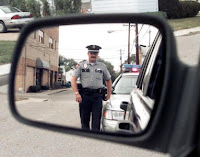
How to beat that traffic ticket
By: Edwin Deronvil
If you've ever been ticketed for speeding or running a red light, you already know that the fine you pay may only be the beginning of your cost.
If it's your second offense, that mistake may very well drain a whopping $700 out of your pocket over the next three years. That's because, on average, a driver's insurance premiums can increase by 25 percent after a second violation.
Most traffic courts rely on the fact that nine out of 10 drivers will just pay their tickets and move on. Established to expedite cases quickly and efficiently, traffic courts serve as vital sources of revenue for many counties.
Their desire to get you in and out can work in your favor when fighting a ticket. Attorneys who specialize in traffic court cases have very high dismissal rates based simply on technicalities. In many cases, with a little effort and research you can obtain the same results.
Auto clubs and insurers are unlikely to publicly give drivers tips for beating tickets in court, but there are a number of things you can do on your own to keep your tickets off your driving record.
Know the Charge
The first process to beat a traffic ticket is to know the exact vehicle code you are accused of violating. Look on your ticket and try to find the section of law you are accused of violating. It's usually written in by the officer towards the top of the ticket and looks something like this: 27.06.907 or this VC 78712
In some instances, it might be checked off to the side already per-marked on the ticket.
Look up the Code
Once you have located the traffic code violation number, you must now look it up. Looking up a traffic code or statute is a fairly simple process.
With either your traffic ticket in hand or code violation written on a piece of paper, go to your nearest law library or your local university law library. Every county has a law library by the way. Ask a librarian what it is you want to do (look up a traffic code statute) and she'll lead you the rest of the way. Nine times out of ten, the librarian will often look it up for you.
You could also use the internet. Not all states post every one of their vehicle statutes online, but some do. Click here to search state traffic laws.
Once you have the traffic code, read it a few times to familiarize yourself with it. Also, try to find all the different elements within that code.
Remember, the elements are all of the different clauses (or statements) within the law.
After you have gotten a general idea about what the law says regarding your traffic ticket violation, it's time to separate all of the different elements.
You'll need a pen for this.
READ THIS FIRST: The main traffic ticket defense is found inside the U-turn page. I would recommend you start with the U-turn defense because the strategy given there is applicable to the other two as well. I only give it once because I felt it would be redundant to continue mentioning it for the other defenses.
